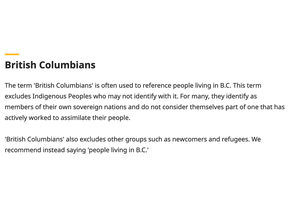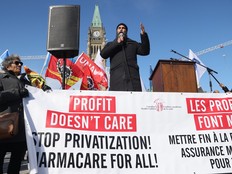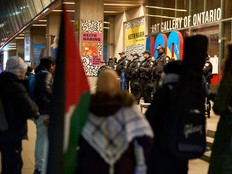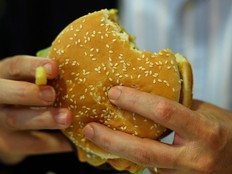| | | British Columbians told to stop using term 'British Columbians' because it's offensive now
The guideline is contained within an official guide for B.C. government workers drafting 'Indigenous content'
Author of the article:
Tristin Hopper
Published Feb 26, 2024 • 2 minute read
1313 Comments
British Columbians
The term "British Columbians" is often used to reference people living in B.C. This term excludes Indigenous Peoples who may not identify with it. For many, they identify as members of their own sovereign nations and do not consider themselves part of one that has actively worked to assimilate their people.
"British Columbians" also excludes other groups such as newcomers and refugees. We recommend instead saying "people living in B.C."

The above memo on “British Columbians” now being an offensive term does not seem to have made its way to the provincial government itself. PHOTO BY GOV.BC.CA
The Province of British Columbia is now instructing its residents not to refer to themselves as “British Columbians” as the term is offensive.
The guideline — first publicized by True North — is contained within an official guide for B.C. government workers drafting “Indigenous content.”
Article content
Writers are told that the term British Columbian “excludes Indigenous Peoples who may not identify with it.”- How the investigation and firing of two high-security virus scientists over leaks to China unfolded
 - NP View: Provinces should reject Trudeau-Singh socialized pharmacare scheme
 - Trudeau reception with Italian PM cancelled in wake of pro-Palestinian demonstration
 - Burger King counters Wendy's 'dynamic pricing' plan by offering free Whoppers
 - 'Disappearance' of Kate Middleton prompts Kensington Palace to issue statement

In referring to First Nations, bureaucrats are told to avoid any moniker associated with B.C. or Canada, a “nation that has actively worked to assimilate (Indigenous) people.”
“’British Columbians’ also excludes other groups such as newcomers and refugees,” it adds.
The correct term, according to the guide, is “people living in B.C.”
It’s a turn of phrase similar to prior government-sponsored revamps of the words “homeless people” or “drug addicts.”
The new government-approved terms — in B.C. and other provinces — are now “people experiencing homelessness” and “people who use drugs.”
Awkwardly, the memo on “British Columbians” now being an offensive term has not yet made its way to the provincial government itself.
The official website of the ruling BC NDP contains nearly 900 usages of the term “British Columbians,” including many press statements issued in just the last few weeks.
On Jan. 30, for instance, the party published a statement about all the ways they are “helping British Columbians with costs.” As per the style guide of their own government, the statement would appear to be directed only at those provincial residents who are not Indigenous, refugees or newcomers.
The “Terminology in Indigenous content” guide also includes a list of outdated terms that bureaucrats are instructed to avoid.
This includes “Aboriginal groups,” “Aboriginal interest” and the word “traditional.” “Traditional knowledge, traditional territories, makes it seem like it is only applicable to the past and not the present,” it reads.
B.C. also happens to be the same province that is engaged in a years-long effort to purge absolutely every piece of provincial legislation of gendered terms.
The program is premised on the notion that non-binary people would not “recognize themselves in the law.” As such, the province has a dedicated team combing through all 154 years of provincial legislation and codes to remove pronouns as well as mentions of any terms that imply the existence of gender such as “father” “aunt” or “herself.”
According to the government’s own style guidelines, the official name for this gender neutrality project is now itself offensive. It is overseen through a regulatory process known as Better Regulations for British Columbians. |
|










